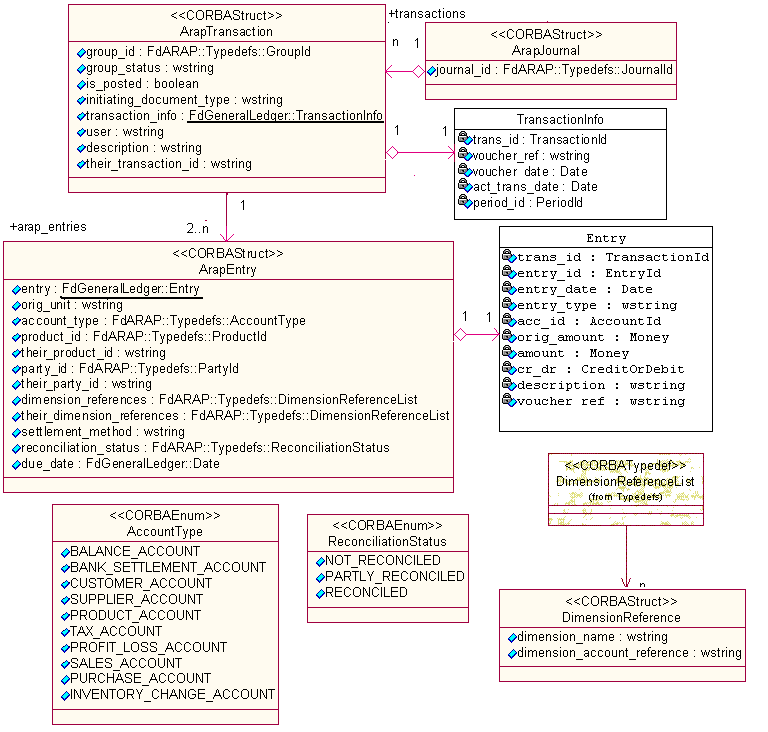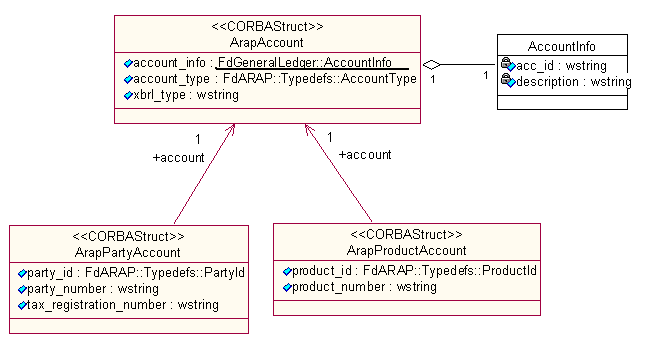
| arapXML | ||||||||
|
|


under construction below this line
---------------------------
ARAP Facility - List of object interfaces, with proposed mapping to arapXML:
| Transaction | Entry | Account | |||
| Object Interface | XML element | Object Interface | XML element | Object Interface | XML element |
| trans_id voucher_ref voucher_date act_trans_date period_id |
transactionId transactionDoc transactionDate(legal) transactionDate(posted) transactionDate(period) |
trans_id entry_id entry_date entry_type acc_id orig_amount amount cr_dr description voucher_ref |
transactionId entryId entryDate(legal) entryJournalType account(idContent) amount(original) amount(base) debitOrCredit entryDescription entryDoc |
acc_id description is_control balance |
account(idContent) account(idName) ...n/a account(balance) |
GL Facility - Transaction Information
struct TransactionInfo {
TransactionId trans_id;
wstring voucher_ref;
Date voucher_date;
Date act_trans_date;
PeriodId period_id;
};
typedef
sequence <TransactionInfo> TransactionInfoList;
The data type TransactionInfo specifies summary information about a single, specific GL Transaction. The data type TransactionInfoList is a collection type for multiple TransactionInfo data types
Generally, financial accounting is done within "accounting periods". An accounting period is defined as a period of time (of arbitrary length), whose only constraint is that a given accounting period is shorter than a full financial year. This applies not only to General Ledger accounting, but also to other often related accounting functions such as Accounts Receivable and Accounts Payable, for example. The set up of accounting periods is typically performed only once a year and is the subject of organisational policy. This submission makes no prescriptive statements about the rules that may be applied when using accounting periods.
As of this writing, both Period Management as well as Closing and Reconciliation Facilities are being considered as potential candidates for future OMG FDTF RFPs.
GL Facility - Entry Information
Each GL Transaction is composed of at least two (or more) GL Entries. Every GL Entry in the GL Facility corresponds to either a debit or a credit. Each GL Entry contains the details of an amount (debited or credited) in a foreign currency, as well that same amount in the nominated reporting currency of a specific General Ledger. In combination with the historical exchange rate information provided by an instance of the OMG Currency Facility, this provides sufficient information to generate multi-currency general purpose financial statements, should this be required.
struct Entry {
TransactionId trans_id;
EntryId entry_id;
Date entry_date;
EntryType entry_type;
AccountId acc_id;
Money orig_amount
Money amount;
DebitOrCredit dr_cr;
wstring description;
wstring voucher_ref;
};
typedef
sequence<Entry> EntryList;
The data type EntryList specifies a collection type for multiple GL Entries. The data type Entry specifies information about a single GL Entry.
struct EntryTypeInfo {
EntryType type;
wstring description;
};
typedef sequence<EntryTypeInfo> EntryTypeInfoList;
The data type EntryTypeInfo refers to a single, specific GL Entry type and an associated high level description such as "Journal Debit" or "Journal Credit", for example. The data type EntryTypeInfoList is a collection type of EntryTypeInfo.
The member description refers to a high level, human-readable description such as "Journal Credit" or "Journal Debit", for example.
copyright notice:
Used with the permission of the Object Management Group. For information on joining the OMG or additional information, please contact OMG headquarters by phone at +1-781-444 0404, by fax at +1-781-444 0320, or by email at info@omg.org. The OMG provides current information and services for distributed enterprise computing on the World Wide Web at www.omg.org and www.corba.org. Information about OMG Japan can be found at www.omgj.org.
The Object Management Group is an international non-profit standards organization that promotes a full-lifecycle approach to enterprise integration. OMG's standards cover application design and implementation.
CORBA®, The Information Brokerage®, CORBA Academy®, IIOP® and the Object Management Group logo® are registered trademarks of the Object Management Group. OMG(tm), Object Management Group(tm), the CORBA Logo(tm), "The Middleware That's Everywhere(tm)" , the CORBA Academy logo(tm), XMI(tm), MOF(tm), CWM(tm), OMG Interface Definition Language(tm), IDL(tm), CORBAservices(tm), CORBAfacilities(tm), CORBAmed(tm), CORBAnet(tm), UML(tm), the UML Cube Logo, "We're Known By The Companies We Connect(tm)", Model Driven Architecture(tm), MDA(tm), OMG Model Driven Architecture(tm), OMG MDA(tm), "The Architecture of Choice for a Changing World(tm)", and Unified Modeling Language(tm) are trademarks of the Object Management Group.